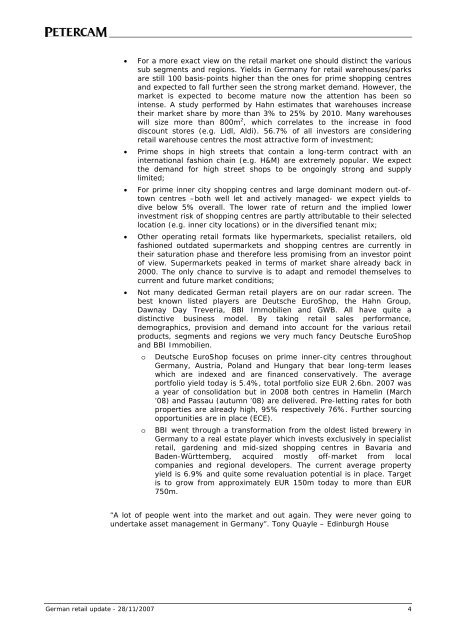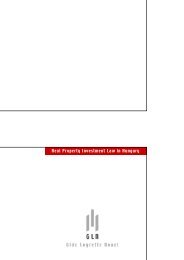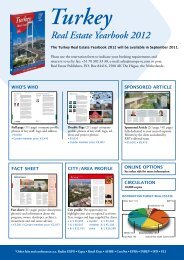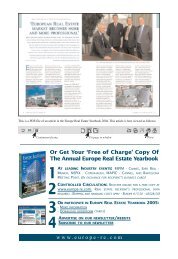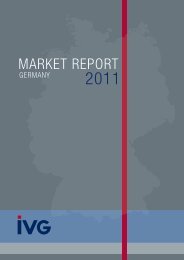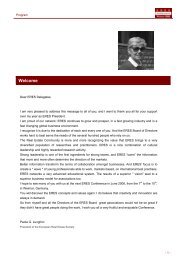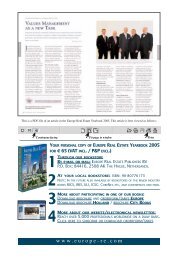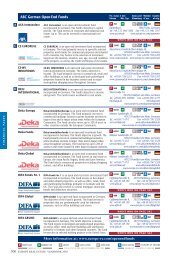DIRECT MARKET REPORT GERMAN RETAIL - Europe Real Estate
DIRECT MARKET REPORT GERMAN RETAIL - Europe Real Estate
DIRECT MARKET REPORT GERMAN RETAIL - Europe Real Estate
You also want an ePaper? Increase the reach of your titles
YUMPU automatically turns print PDFs into web optimized ePapers that Google loves.
• For a more exact view on the retail market one should distinct the various<br />
sub segments and regions. Yields in Germany for retail warehouses/parks<br />
are still 100 basis-points higher than the ones for prime shopping centres<br />
and expected to fall further seen the strong market demand. However, the<br />
market is expected to become mature now the attention has been so<br />
intense. A study performed by Hahn estimates that warehouses increase<br />
their market share by more than 3% to 25% by 2010. Many warehouses<br />
will size more than 800m 2 , which correlates to the increase in food<br />
discount stores (e.g. Lidl, Aldi). 56.7% of all investors are considering<br />
retail warehouse centres the most attractive form of investment;<br />
• Prime shops in high streets that contain a long-term contract with an<br />
international fashion chain (e.g. H&M) are extremely popular. We expect<br />
the demand for high street shops to be ongoingly strong and supply<br />
limited;<br />
• For prime inner city shopping centres and large dominant modern out-oftown<br />
centres –both well let and actively managed- we expect yields to<br />
dive below 5% overall. The lower rate of return and the implied lower<br />
investment risk of shopping centres are partly attributable to their selected<br />
location (e.g. inner city locations) or in the diversified tenant mix;<br />
• Other operating retail formats like hypermarkets, specialist retailers, old<br />
fashioned outdated supermarkets and shopping centres are currently in<br />
their saturation phase and therefore less promising from an investor point<br />
of view. Supermarkets peaked in terms of market share already back in<br />
2000. The only chance to survive is to adapt and remodel themselves to<br />
current and future market conditions;<br />
• Not many dedicated German retail players are on our radar screen. The<br />
best known listed players are Deutsche EuroShop, the Hahn Group,<br />
Dawnay Day Treveria, BBI Immobilien and GWB. All have quite a<br />
distinctive business model. By taking retail sales performance,<br />
demographics, provision and demand into account for the various retail<br />
products, segments and regions we very much fancy Deutsche EuroShop<br />
and BBI Immobilien.<br />
o Deutsche EuroShop focuses on prime inner-city centres throughout<br />
Germany, Austria, Poland and Hungary that bear long-term leases<br />
which are indexed and are financed conservatively. The average<br />
portfolio yield today is 5.4%, total portfolio size EUR 2.6bn. 2007 was<br />
a year of consolidation but in 2008 both centres in Hamelin (March<br />
’08) and Passau (autumn ’08) are delivered. Pre-letting rates for both<br />
properties are already high, 95% respectively 76%. Further sourcing<br />
opportunities are in place (ECE).<br />
o BBI went through a transformation from the oldest listed brewery in<br />
Germany to a real estate player which invests exclusively in specialist<br />
retail, gardening and mid-sized shopping centres in Bavaria and<br />
Baden-Württemberg, acquired mostly off-market from local<br />
companies and regional developers. The current average property<br />
yield is 6.9% and quite some revaluation potential is in place. Target<br />
is to grow from approximately EUR 150m today to more than EUR<br />
750m.<br />
“A lot of people went into the market and out again. They were never going to<br />
undertake asset management in Germany”. Tony Quayle – Edinburgh House<br />
German retail update - 28/11/2007 4


